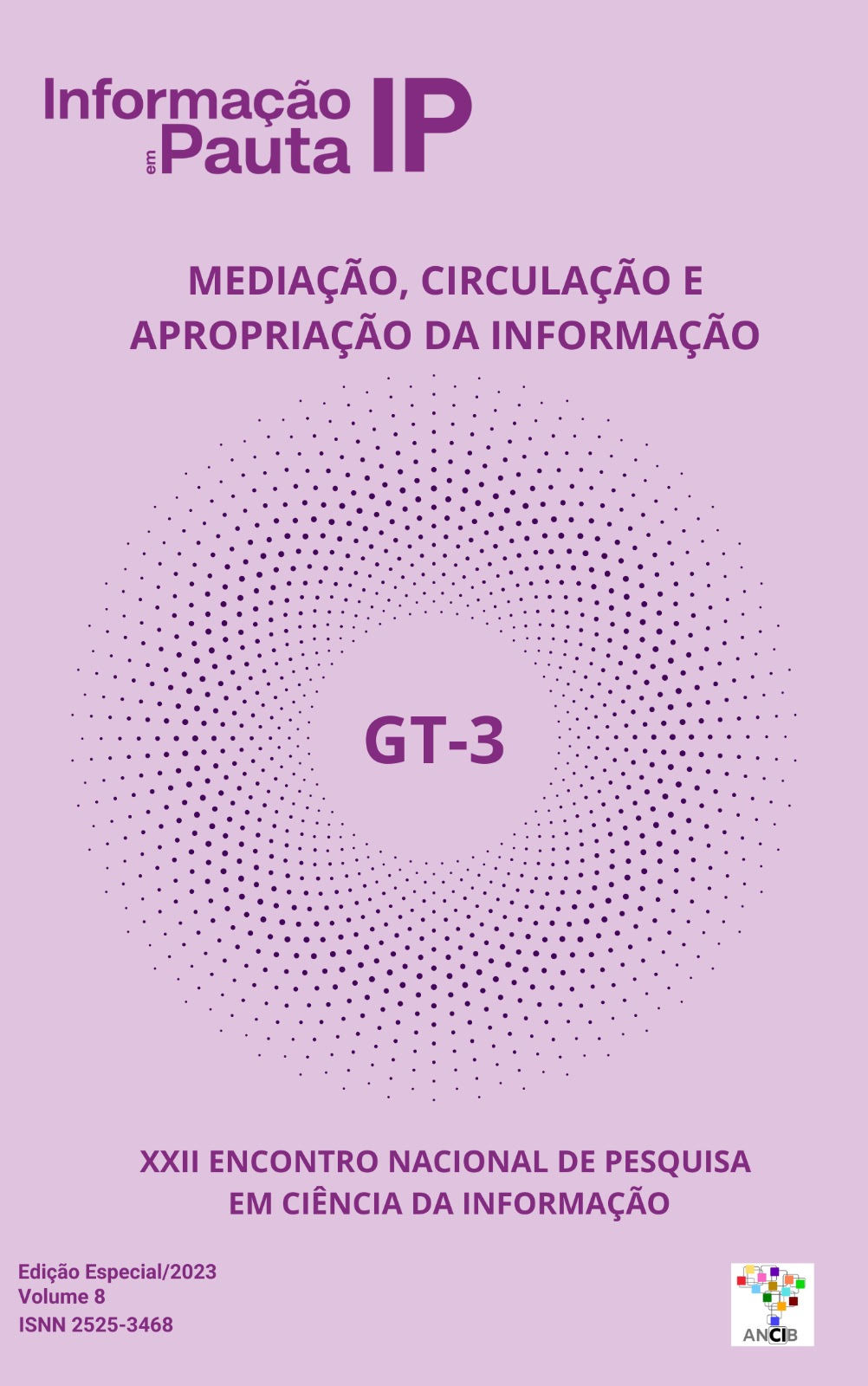DISINFODEMIA
NEGATIONISM AND DEINFORMATION IN THE CONTEXT OF COVID-19 IN BRAZIL
DOI:
https://doi.org/10.36517/2525-3468.ip.v8iesp.2023.90662.327-343Keywords:
Disinformation; Pandemic COVID-19; Disinfodemic; Disinformational PracticesAbstract
In addition to highlighting challenges and limitations inherent to the health system, science, and technologies focused on the containment of a Virus, the COVID-19 pandemic exposed some characteristics of a society that disseminated disinformation with the same speed with which it disseminated factual information. This reality, defined as disinfodemy, made scientific denialism and some nuances of disinformation such as fake sciences, false testimonies, conspiracy theories, fake news, among others, constitute forces that may have hindered the implementation of measures to contain the spread of COVID-19. In the Brazilian context, some informational practices of Federal Government agents related to the COVID-19 pandemic may have been developed from intentionally and strategically constituted disinformational aspects. Given this, in this study we use the concept of disinformational practices, to contemplate this relationship between the subject and the information from the interaction with disinformation. Thus, we developed this empirical, descriptive and documental research, of qualitative approach, which aims to analyze the disinformation and the scientific negationism related to the COVID-19 pandemic and propagated in the speeches and interviews of President Jair Bolsonaro in the first year of the pandemic. For analysis, the various categories of misinformation related to the pandemic and verified by the fact-checking agency Aos Fatos originated from public speeches, publications on social media (Facebook, Twitter and Telegram), lives on YouTube and interviews of President Jair Bolsonaro propagated during the first year of the pandemic were used. This initial investigation allows us to trace an overview of how disinformation can be used as narratives of the pandemic management carried out by the Federal Government in Brazil.
Downloads
References
BARDIN, Laurence. Análise de conteúdo. São Paulo: Edições70, 2011.
BOURDIEU, Pierre. O poder simbólico. Rio de Janeiro: Bertrand Brasil, 1989.
BOURDIEU, Pierre. Razões práticas: sobre a teoria da ação. Tradução Mariza Correia. Campinas, SP: Papirus, 1996.
BRISOLA, Anna Cristina; BEZERRA, Arthur Coelho. Desinformação e circulação de “Fake News”: distinções, diagnóstico e reação. In: ENCONTRO NACIONAL DE PESQUISA EM CIÊNCIA DA INFORMAÇÃO, 18., 2017, Marília. Anais Eletrônicos... Marília: Unesp, 2017. Disponível em:
http://enancib.marilia.unesp.br/index.php/XIXENANCIB/xixenancib/paper/view/1219. Acesso em: 10 jul. 2019.
CASARA, Rubens. O estado pós-democrático [recurso eletrônico]: neo obscurantismo e gestão dos indesejáveis. Rio de Janeiro: Civilização brasileira, 2017.
D’ANCONA, Matthew. Pós-verdade: a nova guerra contra os fatos em tempos de Fake
News. Barueri: Faro Editorial, 2018.
DEMO, Pedro. Metodologia do conhecimento científico. São Paulo: Atlas, 2000.
LÖWY, Michael. Ideologias e Ciência Social. 12. ed. São Paulo: Cortez, 2010.
MARX, K.; ENGELS, F. A ideologia alemã: teses sobre Feuerbach. São Paulo: Martins Fontes, 2001.
MBEMBE, Achille. Nécropolitique. Raisons politiques, 2006/1 (no 21), p. 29-60. DOI :10.3917/rai.021.0029. Disponível em: https://www.cairn.info/revue-raisons-politiques-2006-1-page-29.htm. Acesso em: 06/06/2021.
POSETTI, Julie; BONTCHEVA, Kalina. Desinfodemia: decifrar a informação sobre a COVID-19. Paris, França: UNESCO, 2020. Disponível em: https://gcedclearinghouse.org/sites/default/files/resources/210118por.pdf. Acesso em 2 ago 2021.
RECUERO, Raquel. Desinformação, mídia social e COVID-19 no Brasil [livro eletrônico]. Pelotas, RS: MIDIARS – Grupo de Pesquisa em Mídia, Discurso e Análise de Redes Sociais, 2021.
RIEH, Soo Young; DANIELSON, David. Credibility: a multidisciplinary framework. In B. Cronin (Ed.), Annual Review of Information Science and Technology. v. 41, p. 307- 364. Medford, NJ: Information Today. 2007. Disponível em: https://asistdl.onlinelibrary.wiley.com/doi/10.1002/aris.2007.1440410114. Acesso em: 07 jun. 2022.
ROTHKOPF, David J. When the Buzz Bites Back. Washington Post. May 11, 2003. Page B01. Disponível em: https://moodle2.units.it/pluginfile.php/334512/mod_resource/content/1/Rothkopf%20-%20When%20the%20Buzz%20Bites%20Back.pdf. Acesso em: 04 jun 2021.
SCALES, David; GORMAN, Jack; JAMIESON, Kathleen H. The COVID-19 Infodemic — Applying the Epidemiologic Model to Counter Misinformation. The New England Journal of Medicine. May 12, 2021. DOI: 10.1056/NEJMp2103798. Acesso em: 6 jun 2021.
USCINSKI, Joseph E. Conspiracy Theories: A Primer. Nova Iorque: Rowman & Littlefield, 2020.
ZARACOSTA, John. How to fight infodemic. Lancet, Genebra, v. 395, p. 675, 29 fev. 2020. Disponível em: https://www.thelancet.com/journals/lancet/article/PIIS0140- 6736(20)30461-X/fulltext. Acesso em: 19 jun. 2021.
ZATTAR, M. Competência em informação e desinfodemia no contexto da pandemia de COVID-19. Liinc em revista, v. 16, 2020. Ddisponível em: https://revista.ibict.br/liinc/article/view/5391. Acesso em: 07 jun. 2022.
Downloads
Published
How to Cite
Issue
Section
License
Autores que publicam nesta revista concordam com os seguintes termos:
a. Autores mantém os direitos autorais e concedem à revista o direito de primeira publicação, com o trabalho simultaneamente licenciado sob a Creative Commons Attribution License que permitindo o compartilhamento do trabalho com reconhecimento da autoria do trabalho e publicação inicial nesta revista.
b. Autores têm autorização para assumir contratos adicionais separadamente, para distribuição não-exclusiva da versão do trabalho publicada nesta revista (ex.: publicar em repositório institucional ou como capítulo de livro), com reconhecimento de autoria e publicação inicial nesta revista.
c. Autores têm permissão e são estimulados a publicar e distribuir seu trabalho online (ex.: em repositórios institucionais ou na sua página pessoal) a qualquer ponto antes ou durante o processo editorial, já que isso pode gerar alterações produtivas, bem como aumentar o impacto e a citação do trabalho publicado.



